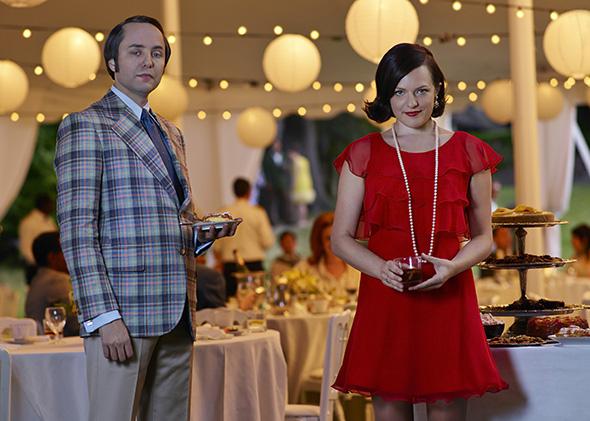John, you forgot the most obvious spinoff idea:
Harry, in which Crane heads to Seattle, moves in with his curmudgeonly dad and a charming British housekeeper, and starts a psychiatric call-in show. Maybe there’s a persnickety brother? Oh right, different Crane.
Hanna, I’m with you: Watching these final seven episodes of Mad Men will be suspenseful, but the suspense will lie in how Matthew Weiner does his work. What kind of ending has he dreamed up? Will it be hopeful? Despairing? And either way, will it be satisfying?
One complicating factor here is that Weiner’s most satisfying endings offer a bracing fresh start. The best finales of Mad Men’s run feature characters shedding exoskeletons of ennui and frustration and emerging pink and tender, with new optimism, authenticity, hunger, and verve. Think about Season 3, when Don and Co. engineered the launch of Sterling Cooper Draper Pryce, or Season 4, when Don proposed to Megan, or Season 6, when Don revealed the squalor of his own childhood to his children in a burst of unprecedented honesty. Even the last demi-season—the first half of this season? ugh, these seasonlets are a pain to label and describe—concluded with Jim Cutler’s ouster and a whole new version of the firm, leaving the possibility that Don might recommit to his true love, his work.
But there are two problems with using another “fresh start” ending for this finale. The first is that fresh starts are inevitably cliffhangers; they leave viewers wondering how the new venture will go, and a series finale offers them no way to ever find out. The second problem is that Mad Men’s succession of fresh starts has given the characters, and the viewers, fresh start fatigue. After watching a decade of Don’s foibles, I’m less likely to believe that he can change. That new marriage, that new business, that new sobriety, that new fatherliness—I’ve seen Don try to build a better life for himself time and again, and then I’ve seen him fail. Which means that even if Weiner leaves us with a final episode of uplift, I’ll be pretty skeptical about whether Don’s new state, whatever it is, will stick.
On the other hand, a sad-sack conclusion, with a solitary Don swirling a glass of Canadian Club, miserable and utterly alone in the world—I don’t have the stomach for it. I’m not sure I like Don very much anymore, but I’m still rooting for him.
What’s at stake here is not just how viewers feel on the morning of May 18 (or Day 1 of the Post–Mad Men Era, as future generations will know it). What hangs in the balance is the larger moral valence of the show. Are humans marvelous creatures of renewal and reinvention? Or are they doomed and deluded? Mad Men is a deeply human production, unusually acute in its observations of the roiling emotional dynamics that can underlie even the most mundane daily interactions. And because the show is emotionally astute, it can be tempting to attribute emotional wisdom to it as well. That’s why I care, I think, whether the show’s outlook is fundamentally hopeful or bleak—and as an optimist, I’m hopeful it will be hopeful. Maybe the point of Don’s fresh start merry-go-round is that he keeps trying, and that trying is enough.
As for the rest of our characters? I have some concerns, based on where the last seven episodes left us. I fear that Roger, after brokering the deal that keeps Don in the business, will find himself on the sidelines again, and frustrated there, no matter the state of his facial hair. I fear that we won’t see enough of Joan. And I’m a little worried that we’re in for a very Ted-centric final arc. We’ve spent a lot of time already this season on Ted’s (not great!) emotional state, and now Ted’s participation is crucial to the success of the company in the new McCann-owned era. I like Ted fine as a foil and love interest for Peggy, but as a freestanding character whose evolution we’re supposed to care deeply about? He showed up too late for me to be invested at that level.
On my wish list for these next seven weeks? Lots of Peggy. Jerk Pete, not sad Pete. And, yes, another great party scene. (Square dance at the commune with Marigold?) I also hope we can stop for a do-si-do with a few of the show’s glorious bit players. I’m particularly partial to the lesser ex-wives, Trudy, Mona, and even Jane. And finally: jokes. It can be easy to forget, as we agonize about Don’s and Peggy’s fates, that Mad Men is one of the funniest shows ever to air on television and that Weiner’s knack for comedy is part of what makes all the history and psychodrama go down so easy. Very much looking forward to draining this glass with the two of you.
Bottoms up!
Julia
Read the previous entry, by Hanna Rosin | Read the next entry, by John Swansburg
